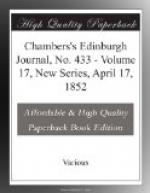The volume affords us some amusing particulars connected with the collision with England. When the British fleet was expected in the Chinese waters, the imperial orders were, to ’listen to no proposals, but fire on the ships, and annihilate them at once.’ To the great emperor, it would have appeared quite ridiculous to condescend to negotiation with so inferior a power as Britain: he had given his orders; these must be obeyed; and his minister had himself written a letter to Queen Victoria, that she might not plead ignorance of the high behests of his Celestial majesty. It was not till the fleet appeared at the mouth of the Pei-Ho, and the capital was in danger, that Taou-Kwang deigned to seek an accommodation by means of his smooth-tongued minister Keshen, who negotiated an armistice, promising that all wrongs would be redressed by a commission appointed to meet the British representatives at Canton. But as soon as the fleet turned southward, the danger was considered visionary; and again the cry arose to punish the insolence of the Western barbarians, as the English were politely designated. The empress-dowager, who was never before known to meddle with state affairs, told her son that ’the English and Chinese could not co-exist under the canopy of heaven; that the Celestial Empire must assert its superiority over these barbarian robbers; and that unless he waged war to their utter extermination, his ancestors would never acknowledge him in Hades.’ Keshen was now denounced as a traitor to his country for having come to any terms; he was sentenced to death; and though his execution was deferred, yet his whole property, amounting in silver alone to the value of three millions sterling, was confiscated; his very wives were sold by auction; and he who had been one of the richest men in the empire, had not the means of buying himself a jacket.
Elepoo, the imperial commissioner at Ning-poo, opposite Chusan, was also denounced. His crime was, that he had, according to the terms of the truce, surrendered the English prisoners, notwithstanding the counter-orders he had received to send them to Peking as trophies of victory, to be cut to pieces according to custom. Among them was a captain’s wife, who had been wrecked, and had thus fallen into his power. A happy thought struck some of the mandarins—that she might be passed off as the sister of the barbarian Queen. She was accordingly put into a cage, and carried about for exhibition; but Elepoo delivered her from the excruciating death she would have suffered as Queen Victoria’s sister, and restored her to her countrymen. The whole cabinet was indignant; he was summoned to appear immediately before his exasperated sovereign, and sentenced to transportation to the deserts of Manchooria.




